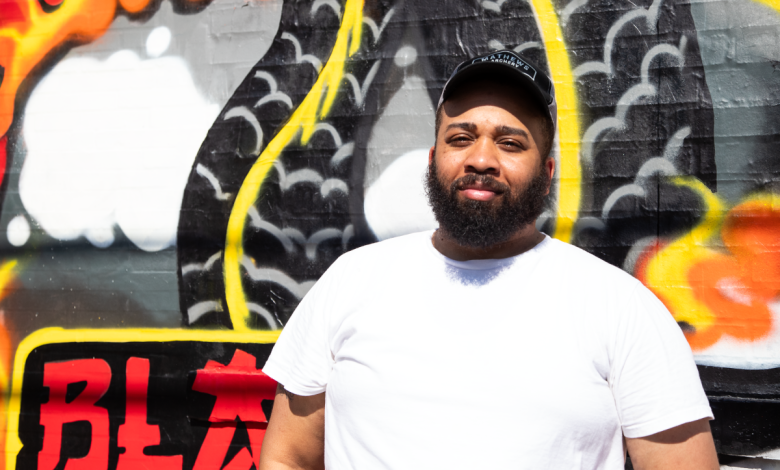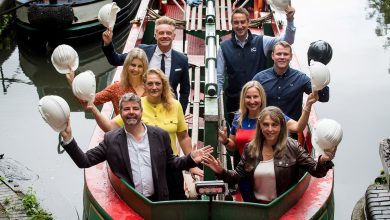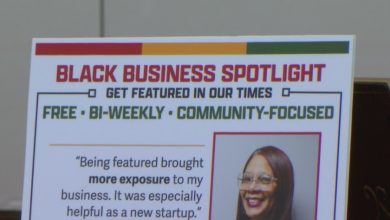Why Philadelphia Must Back Black Brilliance with More Than Rhetoric

Black and women-led businesses across Philadelphia need capital, property access, procurement contracts and freedom from performances of equity.
It’s not that Philadelphia lacks genius. What we lack is alignment — between values and investment, between rhetoric and infrastructure, between those who make this city magnetic and those who are allowed to own a stake in its future.
Across the country, Black business ownership is rising. Employer firms grew by 57% between 2017 and 2022. But here in Philadelphia — a city where nearly half the population identifies as Black or Brown — Black-owned employer businesses make up just over 5% of all firms. The gap between promise and practice is no longer a policy flaw. It’s a design choice.
And yet, I witness brilliance every day.
Omar and Cybille St. Aude-Tate just opened a new location for Honeysuckle on North Broad Street, expanding their West Philly culinary incubator into a full-service ancestral food lab and creative studio. It’s not just a restaurant — it’s an act of cultural stewardship, land memory, and imagination. Meanwhile, Chef Kurt Evans launched Black Dragon Takeout in West Philadelphia, a reimagined Chinese-American carryout spot rooted in soul, intention, and neighborhood revitalization.
These aren’t just restaurants. They’re cultural institutions in the making. They’re also part of a renaissance happening right now across Philadelphia — online concepts and pop-ups evolving storefronts, in backyard supper clubs and co-ops. But what’s missing isn’t talent. It’s infrastructure.
A garden doesn’t grow in sunlight alone. What these businesses need — what Black and women-led businesses across Philadelphia need — is capital, property access, procurement contracts, and freedom from what I’ve come to call the “grand gaslight.”
Specifically, only 1.87% of $31.6 billion in venture capital money was allocated to women and minority-led companies, according to VentureBeat. A study by Harvard Kennedy School found that around 2.4% of VC funding goes to companies with all-female founders, which has remained relatively consistent over the past 30 years.
In the wake of the murders of Breonna Taylor, George Floyd, and Ahmaud Arbery —followed by the uprisings of 2020 — corporate America pledged over $340 billion toward racial equity initiatives, according to a 2023 McKinsey analysis. These numbers seemed enormous at the time. But in the years since, much of that capital has quietly dissolved into bureaucracy, rebranding, or redirection.
Like most students of history, I figure my check must’ve gotten lost in the mail.
Because what we’re offered now feels like performance: equity statements without equity shares, roundtables without reinvestment, murals without land. We are celebrated for our resilience while being denied the very tools to sustain it.
The “grand gaslight” isn’t just financial — it’s emotional. It’s the act of being seen but unsupported. Heard but not funded. Brought into boardrooms, then sent out the service entrance.
And this isn’t just anecdotal. Philadelphia has one of the lowest business densities of any major U.S. city—just 12.1 businesses per 1,000 residents. According to Drexel’s Nowak Lab and the Economy League, most Black-owned businesses here are sole proprietorships. That’s not for lack of ambition. It’s because the on-ramps to scale — commercial leases, credit lines, government contracts—are blocked or under-provisioned.
Meanwhile, cities like Atlanta and Charlotte are showing what’s possible. Their governments and anchor institutions are investing in commercial corridor stabilization, local procurement reform, and public-private capital stacks. In Philadelphia, we’re still throwing façade grants at structural displacement.
Brookings’ Andre Perry estimates that Black-owned businesses are undervalued by nearly $3.9 million each, on average. Princeton University Professor and author Ruha Benjamin names this phenomenon “discriminatory design”—a system of exclusion masked as neutrality. Keeanga-Yamahtta Taylor’s Race for Profit shows how even well-intentioned access programs become new channels of exploitation.
Here in Philadelphia, I’ve seen it firsthand: developers praised for inclusion who never return our calls. Cultural leaders doing six jobs with no health insurance. Entrepreneurs treated as charity cases while driving foot traffic, job creation, and neighborhood cohesion.
And yet — I stay. I build. I collaborate. Because I believe Philadelphia still holds the possibility of a truly regenerative, justice-centered economy. The dream I’ve made my reality is one where cultural infrastructure and commercial viability are not seen as contradictions—but as co-authors of the city’s future.
Earlier this year, The Growth Collective³ — our network of Black-led developers, strategists, and impact investors — was awarded a $600,000 grant from the Mellon Foundation in partnership with the Community Design Collaborative. The initiative, Preserving Black Presence, is a citywide design and sustainability cohort for historic Black cultural anchors—from the Marian Anderson House to Mother Bethel, from the Church of the Advocate to the Henry O. Tanner House. These aren’t just buildings. They are memory-keepers. They are living archives of Black Philadelphia’s contributions, often operating with no HVAC and no development support while gentrifiers pave new narratives around them. Preserving Black Presence offers not just architectural services, but a new ethos: that design is not neutral—and if we are to tell the truth with our city’s built form, it must begin with who has the right to remain.
It’s in that same spirit of purposeful infrastructure that I became an early investor in Bon Vivant Safety Eyewear Company, founded by my colleague and brother in mission, Anthony B. Miles—a U.S. Navy veteran, visionary entrepreneur, and one of the only Black opticians operating at scale in the nation. Bon Vivant isn’t a lifestyle brand. It’s a veteran- and Black-owned manufacturing company creating patented, ANSI-certified prescription and diabetic eyewear tailored for military families, industrial workers, healthcare professionals, and underserved communities. Already, it’s secured contracts with AAFES and Newport News Shipbuilding. But what’s coming next is even more ambitious.
The company is currently raising capital to establish a manufacturing facility in North Philadelphia. Not in some far-flung suburb or trade zone—but right here, in the heart of a community hollowed out by deindustrialization and predatory neglect. This factory would not only bring good-paying, skilled jobs back to the corridor—it would create a pipeline for reentry employment, youth apprenticeships, and public health equity. It would convert an opportunity zone into a zone of tangible, everyday impact—where safety eyewear is produced by and for the very people too often left out of the industrial economy’s returns.
And this isn’t theoretical. It’s happening. Quietly. Daily. Just like BlackStar Film Festival, where I’ve served on the board for the past 14 years, watching it grow into an international gathering of 14,000 creatives and storytellers from across the global majority. That didn’t happen through charity. It happened through belief, rigor, strategy and unapologetic cultural clarity. We didn’t ask for permission to shine—we built a platform that made it inevitable.
What if we treated every Black entrepreneur in this city with that same seriousness? What if, instead of another “capacity-building” pilot, we seeded long-term capital trusts and community holding companies? What if cultural preservation and industrial revival weren’t seen as separate policy goals, but as twin engines of public good?
This fall, the Next City Vanguard Conference comes to Philadelphia. It’s an opportunity — not to perform inclusion, but to imagine and fund solutions to poverty. To center the voices already redesigning our economic reality. To look to Lancaster Avenue and Germantown Avenue— not as “up-and-coming,” but as corridors already experiencing a grassroots renaissance. From renowned author and activist Marc Lamont Hill’s Uncle Bobbie’s to Ubuntu Fine Art to Our House Culture Center to Shantrelle P. Lewis’s Beaucoup Hoodoo, Black creatives are reclaiming space and reimagining the possible with every pop-up, gallery show, storefront activation, and metaphysical boutique. And no mention of this movement would be complete without honoring the genius of Jeannine Cook, whose work at Harriet’s Bookshop in Fishtown has redefined what a literary sanctuary can be — equal parts intellectual salon, revolutionary classroom, and neighborhood altar to Black women’s brilliance.
These aren’t outliers. They’re bellwethers.
Christina Sharpe calls it wake work — building futures while living in the afterlives of state violence and systemic erasure. Black entrepreneurship in Philadelphia is wake work. It’s also seed work. Every co-op, every commissary kitchen, every preservation trust is a refusal to vanish. A commitment to stay and shape what comes next.
What we need now is not another press release. We need land. Operating capital. Procurement reform. Public policy that doesn’t expire at the end of a fiscal year. Cultural infrastructure that endures.
The brilliance isn’t hypothetical. It’s already here. It’s on your block. It’s building a factory. It’s reclaiming a sanctuary. The only question left is whether we will finally back it — with balance sheets, with regional resolve, and with an imagination expansive enough to see Black and Brown and immigrant entrepreneurs not as liabilities to manage, but as the architects of the city we claim to love.

Tayyib Smith is serial entrepreneur; founding partner and chief strategist at The Growth Collective³’ a partnership with the vision is to provide access to resources and capital that will elevate communities of color and generate wealth for neighborhoods victimized by systemic racism.
A principal at Smith & Roller Holdings, a real estate company that engages and invites diverse stakeholders of neighborhoods to become part of a growing, multicultural and multi-socioeconomic tapestry. Tayyib has long been a successful conduit of professional and cultural ecosystems. He is a Board member at The Kensington Corridor Trust, The Prizm Art Fair in Miami, and Black Star Film Festival.
Tayyib is dedicated to cultural competency and the ability to engage multicultural audiences. He co-founded Pipeline Philly to serve as an inviting and dynamic co-working space filled with professionals from various backgrounds and industries, creating one of the most diverse workspaces in the city.




